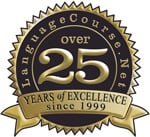Language LevelsHow long does it take to learn a language or reach a specific level?
Lessons & weeks needed to reach level
The following table gives some guidance on how long it takes to progress from one language level to the next.
| Level (CEFR) | Level descriptions | LESSONS needed per level | WEEKS needed (20 lessons per week) | WEEKS needed (2 lessons per week) | LESSONS needed from beginner level | |||
|---|---|---|---|---|---|---|---|---|
| A1 | Beginner | No knowledge, or an understanding of only a very few basic words/phrases. | A1 to A2 | 80 | 4 | 40 | A1 to A2 | 80 |
| A2 | Elementary | Can understand and speak about simple topics: i.e. family, shopping, hobbies. | A2 to B1 | 160 | 8 | 80 | A1 to B1 | 240 |
| B1 | Intermediate | Can speak about future and past events, give reasons and explanations for a situation. | B1 to B2 | 180 | 9 | 90 | A1 to B2 | 420 |
| B2 | Higher Intermediate | Can speak about abstract topics, produce clear detailed text on many subjects. | B2 to C1 | 200 | 10 | 100 | A1 to C1 | 620 |
| C1 | Advanced | Can use language flexibly and effectively. | C1 to C2 | 220 | 11 | 110 | A1 to C2 | 840 |
| C2 | Proficiency | Can express himself/herself spontaneously, very fluently and precisely. | ||||||
The data above is based on data for learning English.
CEFR stands for "Common European Framework of Reference for Languages" and is the most widely used language level standard worldwide. See corresponding TOEFL, IELTS and other exam scores
Time Multipliers for languages other than English
For native speakers of Western Latin based languages:
| 1 * | Spanish, Portuguese, Italian, French, Dutch, Swedish, Norwegian |
| 1.25 | German |
| 2 | Greek, Hungarian, Polish, Russian, Thai, Vietnamese |
| 3 | Arabic, Chinese, Japanese, Korean |
* These languages are a bit more difficult to learn than English, which would add some learning time. On the other hand for most students these languages are not the first foreign language they learn, which accelerates their learning. In the end both factors compensate each other so that on average the learning time for those languages will be similar to English in practice.
Other factors that will affect the speed of your language learning progress
- Your native language: The more similar your native language is to the language you want to learn the faster you will progress. This may be one of the most important factors affecting your learning speed.
- Experience in learning other languages: The more experience you have in learning foreign languages the easier it will be to learn just another one. Also the more similar these foreign languages are to the language that you plan to learn the faster you will progress.
- Homework & self-study time: The more learning time you dedicate to learning the language outside of the classroom the better.
- Exposure to language outside class-room: You will progress much faster if you are living in the country where the language is spoken or if you expose yourself to the languages by watching TV, reading or playing video games in the language you want to learn.
- Practicing speaking & class size: The smaller the class size the more opportunity you will have to actively speak the language. Also choosing homestay accommodation compared to shared flats and residences will increase your opportunities to practice speaking the language, which tends to be a major obstacle for many language learners in order to advance.
- Intensity - # lessons/week: Obviously, you will advance faster the more lessons per week you take. The intensity of the course also has a further impact on the speed of your progress. Attending an extensive language course of 2-4 lessons per week at your school or university means you will generally spend more time on homework per lesson compared to an intensive course of 20 lessons per week. However, in extensive courses, which use to stretch over many years it is inevitable that you are more likely to forget previous course content, and you may need to continuously spend time on refreshing previously learned content.
Scores of most popular English exams per level
| Level (CEFR) | IELTS | TOEFL iBT | TOEFL CBT | TOEFL paper | TOEIC | Cambridge English Key | Cambridge English Preliminary | Cambridge English First | Cambridge English Advanced | Cambridge English Proficiency | |
|---|---|---|---|---|---|---|---|---|---|---|---|
| A1 | Beginner | 0-1.5 | 0-18 | 0-60 | 0-343 | 0-245 | - | - | - | - | - |
| A2 | Elementary | 2-3.5 | 19-40 | 63-120 | 347-433 | 246-380 | Grade Pass-Merit | - | - | - | - |
| B1 | Intermediate | 4-5 | 4164 | 123-180 | 437-510 | 381-540 | Grade Distinction | Grade Pass-Merit | - | - | - |
| B2 | Higher Intermediate | 5.5-7 | 65-95 | 183-240 | 513-587 | 541-700 | - | Grade Distinction | Grade B-C | - | - |
| C1 | Advanced | 7.5-8 | 96-110 | 243-270 | 590-637 | 701-910 | - | - | Grade A | Grade B-C | - |
| C2 | Proficiency | 8.5-9 | 111-120 | 273-300 | 640-677 | 911-990 | - | - | - | Grade A | Grade A-C |
















